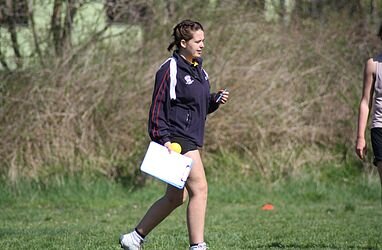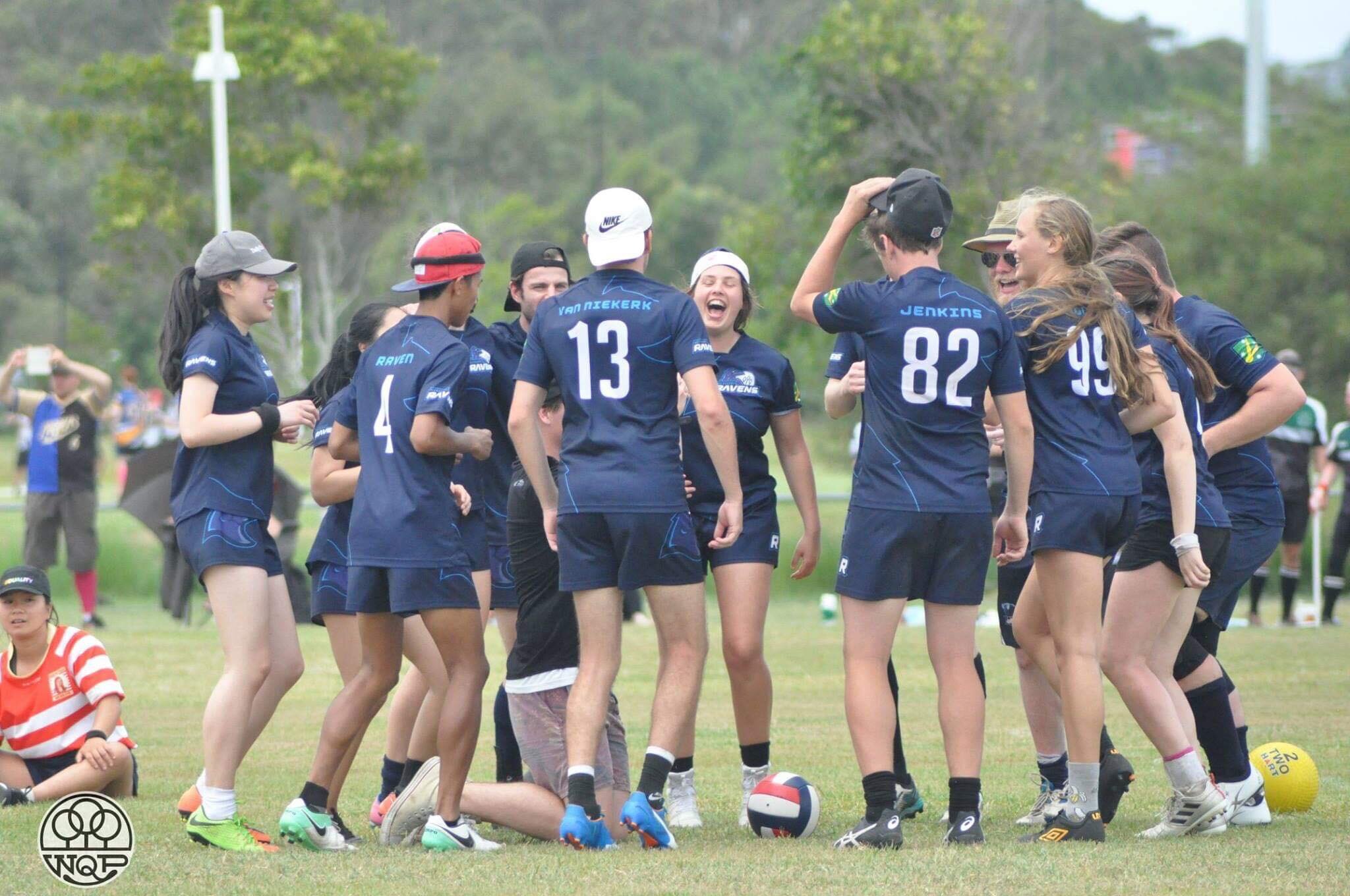An exchange year for the national team
Zur deutschen Version geht es hier.
Emily McKie defends the ball during a training session
© privat
Because Emily McKie got the offer to coach the German national women's footy team, the Australian came for a semester abroad to Germany. In our interview, she compares the national sport in her home country with the German community sport. She also explains why, as a coach, she focuses more on personal relationships than on tactics and why she sees sporting parallels with Quidditch.
Magazin des unpopulären Sports: What amazes you the most about Australian Football?
McKie: Aussie Rules is really big in my state, which is Victoria. When you grow up, the sport is a really big thing. People talk about it all the time and there is a really big connection with the club that you support. I really like that it is accessible for a lot of people. It is really cheap to play, so a lot of young people get to play football. We even have a public holiday for the Grand Final. The day before, there is a parade and the whole city shuts down.
You started coaching and playing in 2011. What made you start?
McKie: I loved the game as a kid, I was obsessed with it. But I was never allowed to play because my mom said it was too rough. After I quit school in 10th grade I thought about taking some kind of apprenticeship course and I chose the AFL-one that I could find. Part of that course was that I had to coach and I’ve been coaching ever since then. In 2011 a friend of mine started up a team for girls and my mom let me play in that. But I stopped playing when I was about 18 because there was no pathway for me to continue onto.
During your exchange year in Leipzig you got involved with the German and European football clubs. How did that start?
McKie: I took a trip to Germany in 2018 halfway through the year and because of my working background with AFL I connected with AFL Europe and emailed them. I was always interested in what happens about football in Europe. I flew over to London during my visit in Germany. While I was there they connected me to a person that was really trying to develop football in Germany and was based in Hamburg. So I went there, too, and stayed for a few nights. That made me fall in love with the game again, because I was a bit burnt out from working too much in football back home in Australia. I asked about the national team and it came out in the conversation that if I had the chance to come back to Germany I could coach them. The team had just started and I knew I could take them up to the next level. They said if I want to do it and organise everything I could do it. So I made that a project.
McKie leitet eine Trainingseinheit beim Nationalteam.
© privat
Your decision to come to Germany as an exchange student was made only because of Australian Football?
McKie: Yeah. I wanted to coach at a high level. In Australia there are a lot of opportunities for females to coach but not a lot of professional development and education. And I didn’t want to be another female coach that was thrown into the deep end but didn’t know what I was talking about. I really wanted to have a bit of a reputation when it came to coaching and I thought “What kind of young girl would go to the other side of the world and coach a football team?”. That was part of that as well. I saw it as an opportunity to propel my career and it worked. I got involved in high level stuff when I came back to Australia.
What is your approach to coaching? What do you focus on?
McKie:I’d say that my approach is the whole person. I spend a lot of time with my players figuring out what’s important to them, what’s their learning style. I get to know what they are doing, what they do during their spare time, what they’re studying or working and get to build a relationship. I think that is really important in female football or female sport in general. It’s about the relationship you build. There is a quote from the great Alan McConnell (former Footy-player, editor’s note) which is: “For men to feel like they belong in sport they just need to be able to perform. But for women to perform they need to feel like they belong first.” So I go for relationships first and tactics later.
You experienced high level play in Australia as well as the German clubs. What’s the biggest difference between these countries?
McKie: The thing I love the most about German football is that it really felt like community football back home. At the higher levels that I got to know in Australia it becomes more kind of a business and less about community and connection. In Europe you go on weekend long trips to play and for example stay at the opposition’s player’s house. In Australia you have more training time together but on game day you just go to the game and straight home afterwards. There is that. And also the access to quality coaches and people who know what they’re talking about. A lot of Aussies come in and really love the game but their coaching style is late 90’s or early 2000’s. The game has changed since then but because they grew up in that era they coach in that way. I wouldn’t say it is backward but old school and traditional.
McKie (mitte, mit weißem Stirnband) im Kreis ihres Quidditchteams, den Melbourne Ravens.
Which aspects of the game need to be improved by the German teams to catch up with the Australians? Is it possible at all?
McKie: One thing I learned while being involved in the higher levels is that fundamental skills are really important. You play to win. But because when you only focus on winning there is not that much focus on development. The necessity of fundamentals is really emphasized in Australia but I found that it wasn’t so much in Germany. Unless they can really get their fundamental skills up it’s going to be hard to catch up to where the Aussies are.
It’s going to be a long journey.
McKie: The Germans do very well, though. They have some very good players. A lot of players have played in Australia and you can see that. You can definitely tell which ones have played over here. Just the way they are aware of the ball, where it’s going to go, how it’s going to bounce, the decisions that they make. It makes a massive difference compared to those who have only played in Germany.
What was your favourite footy moment during your time in Germany?
McKie: We had our first tournament with the women’s team in Sweden, which was a 9-a-side tournament. I only had like one training camp where I met the players. Everything else I taught online. I completely changed the way I wanted them to play. So, the most beautiful moment for me was in our second game. The first one was against the Irish and they are the best. You can’t beat the Irish. Our players were so disheartened when they lost, especially playing the way I wanted them to play. But in our second game, where we played against Croatia, they did exactly what I told them to do and we scored so many goals. The way that they played was so smart. It was so satisfying for me as a coach to see how they implemented the new game plan and absolutely smash another team.
You also have experience in creating and managing an Australian Football league. What’s your advice concerning growth for the German footy scene?
McKie: It is hard to compare because in Germany you have Aussies coming in and getting drawn into playing football. But they leave again and it’s hard to capitalize on that. So you need to bring Germans in that are going to be there all the time. It really comes back to that relationship and that connection you can make for everybody. I found that when I was talking to some german players, what they like most about Aussie Rules was that you can sit and have a beer with the opposition team after the game. Everybody is just so friendly. You really need to emphasize on the social outside stuff, not just the game. But in saying that, you have to make sure that the Germans are still learning, that you teach them how to kick, how to handpass, the basics of the game.
You also played Quidditch in Germany: What do these sports have in common?
McKie: Both of them don’t make sense when you watch it for the first time. (laughs) I think physicality. In Australia Quidditch is very physical. And there is always a quick switch from offense to defense. There is a similarity in that way that you have to think quickly about what you are going to do and where you are going to go. There is so much going on. Even in Aussie Rules, although there is only one ball.
Is it easier to become a good Quidditch Player or a good Footy Player?
McKie: There are two ways I can answer this. You could say that it is easier to become a good Quidditch player because it is not that popular and people come over from other sports. If you are big and have a background in a physical sport there isn’t a big competition. The thing with being a good Footy player is that there are so many players on the field that you don’t all have to have the same skill set. To be a good footballer you have to be really good at whatever it is that you are good at. Whether you’re a defender, midfield or outside player. There is flexibility in being a good footballer.
Questions were asked by Max Martens



